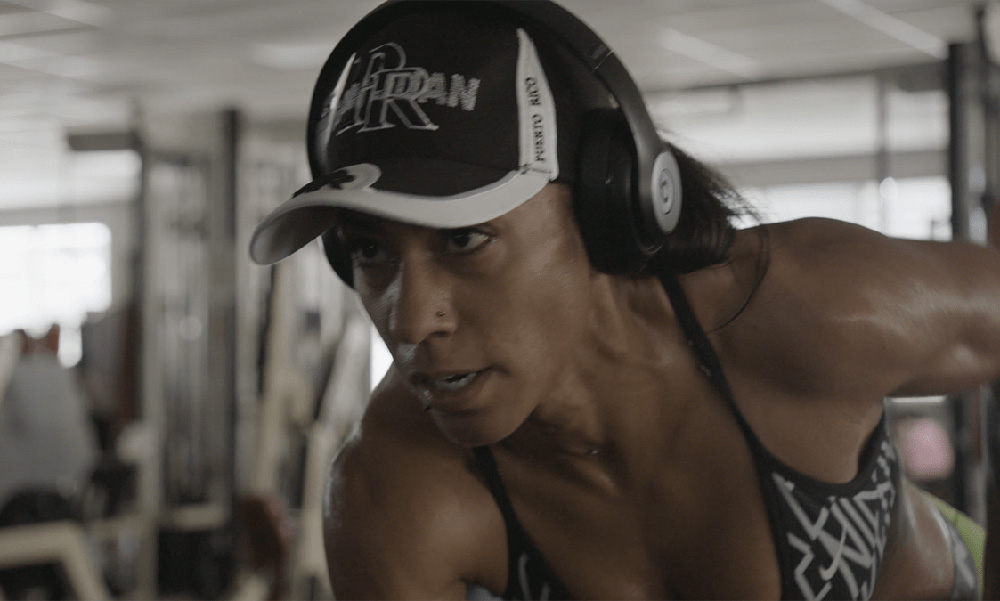You’re aware of Jeannette Feliciano’s fragile soul before her imposing physique in “Jeannette,” which is no small feat when profiling the professional bodybuilder whose strength so immediately catches the eye. Toned and tanned living in Orlando, her muscles are clearly defined even when they’re not properly flexed, but there’s a weariness you hear in Jeannette’s voice before seeing any of that, an introduction that most in her life can’t have but that director Maris Curran can afford her in cinema, freeing her of the steely front she’s had to put up since her youth to hear how she actually feels in a voiceover.
Over the four-and-a-half years Curran ended up spending with Jeannette, somehow an even greater burden would seem to await her than the what initially brought the filmmaker out to profile her in the first place as a survivor of the Pulse Nightclub massacre. If Jeanette’s increasingly distressed spirit first separated from her immaculately constructed body that evening of what was supposed to be a celebratory night of dancing with friends, Curran brings the former to the surface as her daily routine of training others at the gym and getting back into shape herself to compete at bodybuilding competitions will give way to off-screen ruminations of what she’s thinking – occasionally bursting into the picture when her gym partner and friend Yvens “Eazzy” Carrenard will talk about taking different routes now to avoid being anywhere near the scene of the mass shooting or a dispute will break out over equipment and she’ll shut down the threat of violence, no matter how benign it may seem, in an instant.
Although Jeannette would seem well-prepared for this moment, having steeled herself long ago mentally as she navigated growing up gay in the home of a devout Jehovah’s Witness in her mother, the destabilizing effects of losing what safety she felt she had built up for herself only adds to her disorientation and Curran is able to track the compounded trauma, with Jeannette firming up her grip on the circumstances in front of her as she would with any weight she was about to lift before something comes along to make it slippery once more, eventually following her to her ancestral home of Puerto Rico where her sister Leila is similarly unsettled by the devastation of Hurricane Maria. As difficult as it’s become for Jeanette to see beauty, the film finds it in her as she wills herself to be strong for everybody in her life, most notably her teenage son Anthony, and although that same level of support hasn’t always come her way, the sense that she’s been able to dig deep to get what she’s needed to get by in the past allows for the hope that she’ll be able to locate it again.
With its subject generously opening up her own struggle to the camera, “Jeannette” is both intimate and epic, removing any distance from such major news events that can remain abstract from afar and clearly the result of a careful collaboration in which Curran took great pains to make sure Feliciano was comfortable with showing such vulnerability, bringing in people from the community immediately around her as crew and avoiding any traditional documentary practices that would involve retraumatizing the subject by recounting the past. Recently, Curran and Feliciano were kind enough to reunite to answer some questions via e-mail ahead of the premiere of “Jeannette” this week at the San Francisco Film Festival about how they were able to end up with such a moving and introspective film.
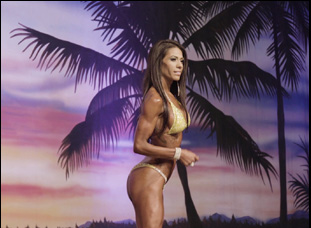
Maris Curran: We started the film with thematic goals, questions and a vision for the story arc, but more than anything, a deep curiosity and flexibility to encounter the unexpected. But to be this nimble, we needed a strong foundation, and for us, that was the relationship between Jeannette and myself. We’re both deeply invested in one another and the project of the film, but it still required a leap of faith.
One of the most rewarding parts of this process is discovering that something you might have imagined to be peripheral can become essential to the story. For “Jeannette,” this was the theme of motherhood. Going into the project, I knew Jeannette was a mother and that she had a complicated relationship with her own mother, but I didn’t imagine that those relationships would be at the core of the film. The central question I started with for the film was: after experiencing such tragedy, how do you ever feel safe again? And for Jeannette, the answer to that question rests in making her son Anthony feel safe and opening up to find comfort in her relationship with her mother. I think it’s one of the most touching elements of the film.
I also became a mother during the making of the film. Life imitating art.
Jeannette, if you know you have the platform of a film, was there something important that you wanted to get across either about your life or your perspective?
Jeannette Feliciano: Honestly, I feel blessed to have this platform. I look at this film like I look at life — I want to inspire people. We all struggle, we are all going through something and I hope this film gives people an example of resilience. I don’t feel that my story is so different than other people, but I hope my story and this film can help others. What do we learn from hardship? How do we use struggle to help others? I want to fight for more positivity in our community. I’m a mother, and it’s important to me to set an example of pushing past judgement toward love. This is what I’m fighting for.
Did anything happen during filming that changed your ideas of what this could be?
Jeannette Feliciano: I think this answer is a bit more personal for me. I realized that making his film was an opportunity for people to see the authentic me. I am often considered a leader and that doesn’t always give room for me to be vulnerable or emotional. And I have moments when I feel lost. And I want to show people that it’s okay to feel lost. So I didn’t hold back while we were making the film. I wanted it to be genuine.
Unexpectedly, the film gave me the opportunity to get closer to my mom. When I saw the film for the first time I was struck by how much my mom loves me. And it was really important to see her love, it’s something I’ve fought for in my life. If you watch the film, you’ll see we have a real fight on camera. I almost never fight with my mom and to have a camera around… wow. But would you believe, it actually brought us closer? I feel like I was able to understand her better and seeing her love softened my heart to her.
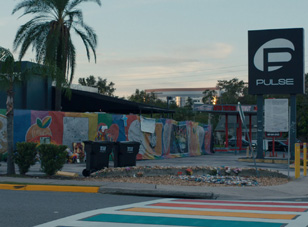
Maris Curran: This film is about the aftermath of trauma and I knew that it was essential to have a small crew to create a safe space to do the emotional work of the film. Jeannette and I spoke early on about what that would mean and honestly, it wasn’t hard to manifest. It took reaching out to a few filmmaker friends who had shot in Orlando, really listening to what would work for Jeannette, interviewing crew members in advance and checking in throughout the process. Our crew was fantastic — professional and respectful —and they brought some needed levity for the tougher days.
Jeannette Feliciano: I loved the people who worked on the film. It made me feel comfortable that there were people I could relate to working and because of that, I became friends with folks. It started with the film, developed and got deeper. I stay in touch with most of the people who worked on the film.
I really loved the idea of strength being juxtaposed mentally and physically. How did that inform the structure of the film?
Maris Curran: This idea informed even the look of the film. I worked on this film with my longtime collaborator, the director of photography Jerry Henry. I wanted the look of the film to feel like Jeannette and her world. Jeannette is bold, she’s strong, she can be brash, but she’s also vulnerable and tender. We worked to have the look of the film reflect that. And the rhythm of the film played a part — I worked with accomplished editors Katrina Taylor and Eduardo Serrano, who gave so much to the film and the sound design was key here too. I worked with another longtime collaborator, Eli Cohn to create sounds to destabilize the realism of the film to suggest what was happening underneath the surface. Then this was amplified in the score by composers Leo Heiblum and Jacobo Lieberman. We used some interesting non-instrumental organic sounds in the score to this end.
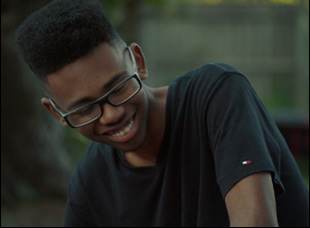
Maris Curran: I knew from the beginning that I didn’t want sit down interviews in the film, but I did want a mechanism to get inside Jeannette’s head. Jeannette is tough — both by necessity and by occupation and it was important in the film that there was a way to break that veneer. I thought of her voice in the film as an emotional guide and wanted it to be spare, combined with sound design and a layer to deepen the film.
In terms of the actual recordings, I set aside a day for each interview and it was just Jeannette and me. We took our time and the conversations were intense and emotional. We took breaks. We cooked for each other.
Jeannette Feliciano: I don’t get that many opportunities to open up. We sat down for these conversations a few times throughout the years of working on the film. For me, it was an opportunity to really talk and let go. With Maris, I really felt like this woman across from me understands me and is not going to judge me. At a certain point, we’d shared so much she stopped being just a director and was a friend, so when we had these conversations, there was a lot of letting go that I needed to do. In some ways, these conversations let me stop holding onto things from the past and continue into my future.
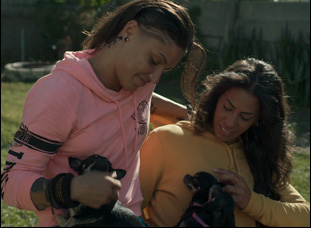
Jeannette Feliciano: For me, and I look back at things in the film and think, “Wow, look how much I’ve grown.” The same way we look at pictures when we were little kids… as adults, we live life and don’t always stop to reflect. For me personally, it’s amazing because it’s an opportunity to see places where my thinking has changed and places where I now have more understanding. I wonder if it can be an opportunity where people can look at my life and reflect back on their lives too. I want people to be able to look at themselves and say they’ve grown too.
Maris Curran: I flew to Orlando to show Jeannette the film before it was finished. We sat in a theater with her dear friend and fellow survivor Yvens “Eazzy” Carrenard, who is also in the film. Hearing them laugh and cry while watching was incredible. After watching, they told me they were proud of themselves. I couldn’t ask for more.
“Jeannette” does not yet have U.S. distribution. It will next screen at Outshine LGBTQ+ Film Fest in Miami at the Regal Cinemas South Beach on April 30th at 2:45 pm and be available virtually in Florida through Outshine at Home from May 1-3.




